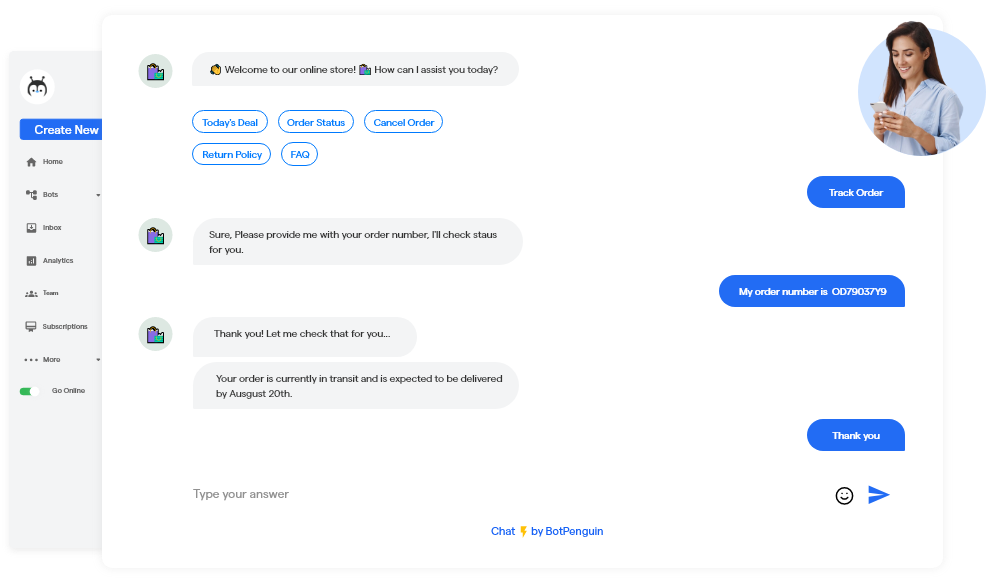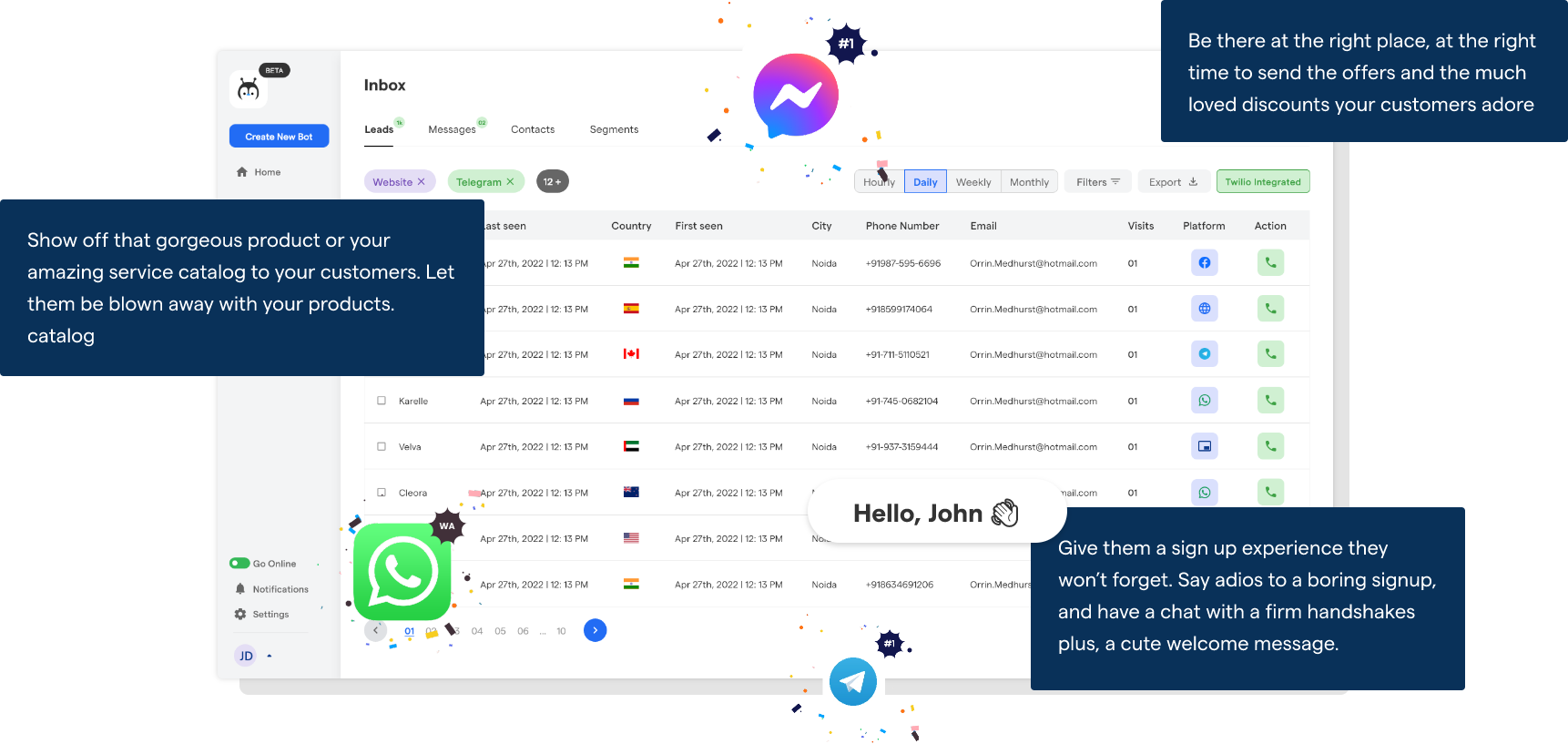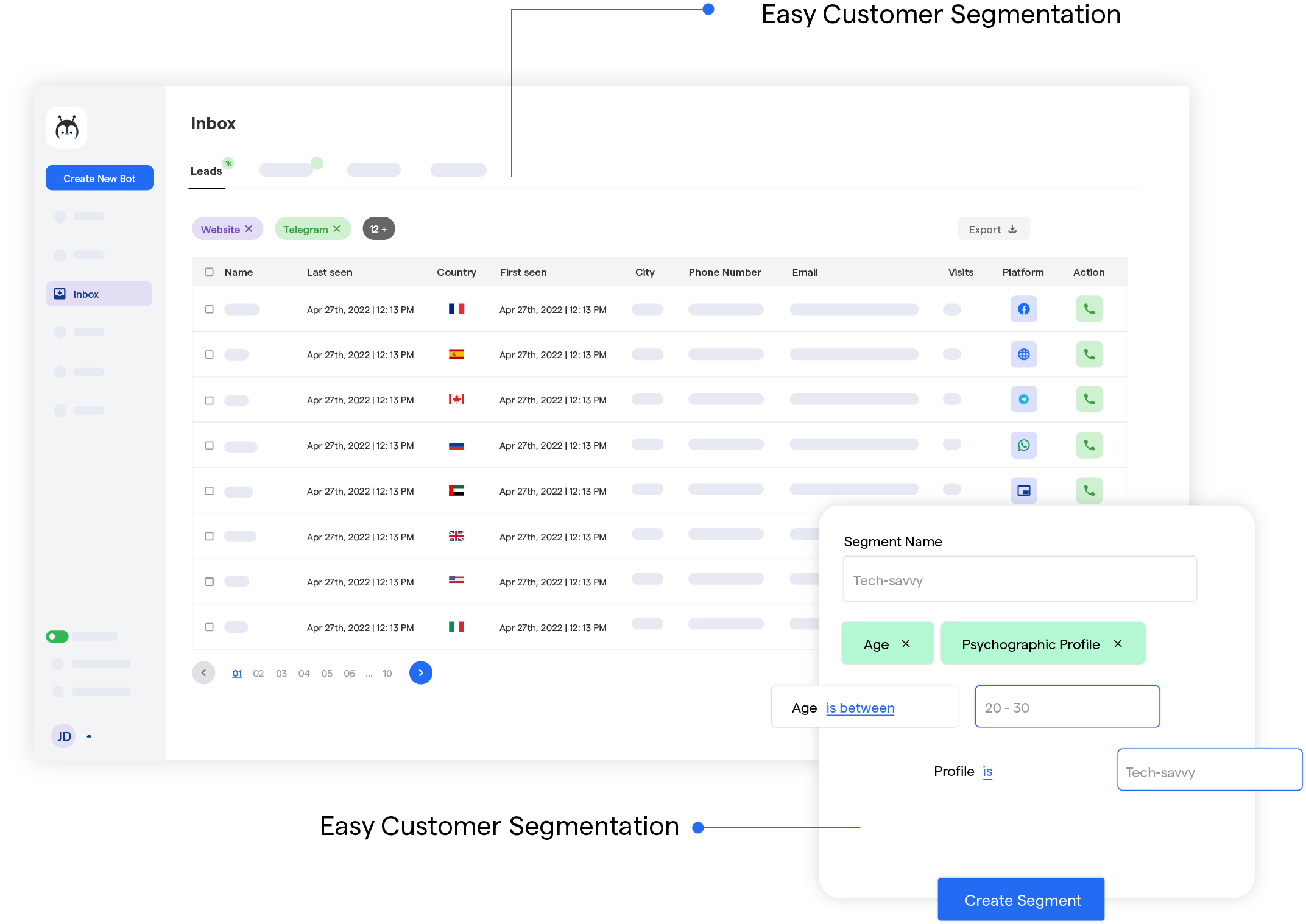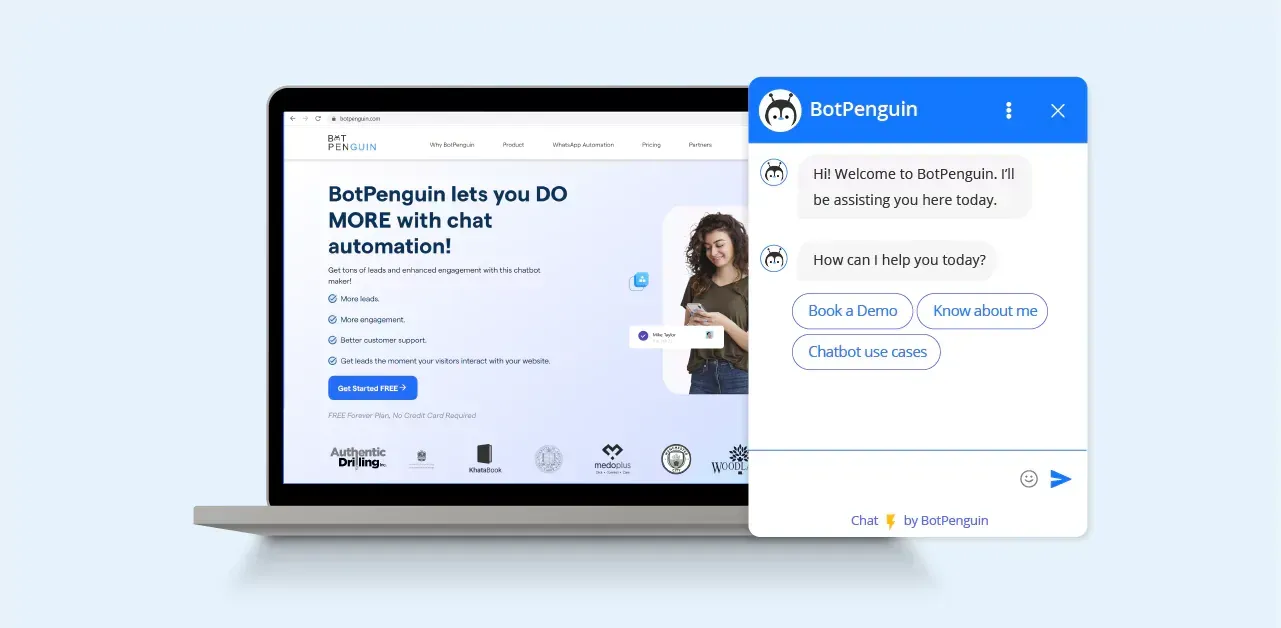AI chatbots for websites are becoming a must-have for businesses looking to improve customer engagement.
According to Juniper Research, over 25% of customer service operations will incorporate website chatbots by 2023. They provide instant, 24/7 support that improves satisfaction and conversion rates.
A HubSpot study found including chatbots on your website can increase conversions by up to 15%. They also collect valuable visitor behavioral data to optimize the user experience.
With customizable greetings and conversational AI, chatbots interact with website visitors like real employees.
A Progress survey found that 61% of businesses already use website chatbots to qualify leads, while Gartner predicts that by 2022, 70% of white-collar workers will communicate with chatbots daily.
As consumers increasingly expect instant, digital-first experiences, incorporating an intelligent chatbot on your site makes sound business sense.
Continue reading as this article will explore the importance of adding a chatbot to your website and provide tips to boost results.
What is a Website Chatbot?

A website chatbot is an artificially intelligent computer program designed to simulate human conversations with website visitors. It is typically embedded in a website's interface, allowing users to engage in real-time conversations to obtain information, get support, or even complete transactions.
These website chatbots can use a variety of interfaces, including text-based messaging, voice recognition, or a combination of both. The goal of a website chatbot is to provide a seamless and personalized user experience, helping businesses to better connect and engage with their customers.
Importance of Website Chatbot in Modern Business
Let's explore some key reasons why website chatbots are essential in modern business:
Handling Customer Inquiries with Ease
Website chatbots are masters at elevating customer service and support. By offering instant assistance and a wealth of information to users, chatbots provide a superior experience. They can handle multiple inquiries simultaneously, alleviating the burden on human customer service agents and providing swift resolutions to customer issues.
Evolving Responses Through Learning
Another remarkable aspect of website chatbots is their ability to learn from customer interactions. By analyzing past conversations, chatbots continuously improve their responses, ensuring consistent service quality. This learning capability allows chatbots to better understand customer needs and deliver more relevant and helpful information or assistance.
Tailoring Recommendations and Support
AI chatbots for websites have the power to provide personalized interactions that make customers feel valued. By analyzing user data and preferences, chatbots can offer tailored recommendations, product suggestions, and customized support. This personalization not only enhances the user experience but also fosters customer loyalty and satisfaction.

Building Rapport and Connection
Furthermore, AI chatbots for websites are capable of creating a warm and friendly atmosphere through conversations that mimic human interactions. Their conversational tone and ability to adapt to individual preferences build rapport and connection with users, ensuring a more enjoyable and engaging experience.
Swift and Accurate Answers
Website chatbots offer the advantage of rapid response times, providing quick and accurate answers to customer inquiries. Unlike human counterparts, AI chatbots for websites like BotPenguin can instantly search through vast amounts of information, reducing waiting times and improving customer satisfaction by delivering prompt solutions.
Minimizing Frustration and Abandoned Queries
With chatbots’ quick response time, customers are less likely to become frustrated and abandon their queries. By addressing issues promptly, chatbots ensure that customers feel heard and their needs are met, further strengthening customer relationships and loyalty.
Always at Your Service
Customer needs don't adhere to strict business hours. That's where the remarkable benefit of chatbots - 24/7 availability - comes in. With website chatbots, businesses can provide support and assistance anytime, ensuring that no customer inquiry goes unanswered. This is especially beneficial for global enterprises with customers in different time zones, enabling them to deliver seamless support around the clock.
Enhancing Customer Convenience
The round-the-clock availability of chatbots enhances customer convenience by eliminating the frustration of waiting for business hours to receive assistance. Customers can engage with chatbots whenever they want, allowing them to get the information or support they need at their convenience.
Engaging Users from the Start
Website chatbots are not merely conversation starters; they are powerful lead-generation tools. By engaging website visitors in meaningful conversations, chatbots gather valuable information about their preferences and needs. This data empowers businesses to offer targeted recommendations, discounts, and personalized messages, increasing the likelihood of lead conversion.
Nurturing Relationships through Proactive Guidance
Moreover, website chatbots can proactively guide website visitors through the sales funnel, offering assistance, and information at each stage. By providing a seamless and personalized purchasing experience, chatbots greatly contribute to increased lead generation, conversions, and revenue.
Suggested Reading:
Captivating Conversations and Guidance
Website chatbots act as virtual assistants, creating engaging experiences that captivate website visitors. Through conversational interactions and proactive guidance, chatbots help users find what they're looking for, provide information, and make suggestions. By guiding visitors through their journey, chatbots build trust, enhance the user experience, and encourage further exploration.
Injecting Personality and Fun
Website chatbots can also inject personality and fun into the user experience, making interactions enjoyable and memorable. With witty responses and playful banter, AI chatbots for websites create a warm and friendly environment, leaving a lasting impression on website visitors.
Valuable Insights for Marketing Strategies
In data-driven marketing, website chatbots play a crucial role in collecting valuable user information. Through conversational interactions, chatbots can gather email addresses, phone numbers, and specific preferences, among other details. This data is invaluable for building customer profiles, understanding user behavior, segmenting audiences, and enhancing marketing strategies.

Safeguarding Privacy and Consent
To maintain trust and respect users' privacy, AI chatbots for websites should always seek consent before collecting personal information. Respecting privacy and implementing secure data storage practices are vital in maintaining a positive user experience and complying with data protection regulations.
Assisting at Every Step
Website chatbots have proven to be effective sales tools, expertly guiding users through the sales funnel. They can suggest relevant products, provide detailed information, and even offer discounts or promotions to incentivize purchase decisions. By providing a personalized and seamless purchasing experience, chatbots contribute to increased sales and revenue.
Reengaging Abandoned Carts
Chatbots can also play a role in re-engaging customers who have abandoned their shopping carts. By sending reminders, offering discounts, or addressing any concerns, chatbots help bring customers back to complete their purchases.
And to implement effective retargeting you need two things: A well-integrated CRM and an effective bulk message sender. And BotPenguin can do both of these things.
By integrating a CRM with your chatbot you can set up drip campaigns and send bulk messages on platforms that are convenient for your customers. Because BotPenguin provides no code AI chatbots for multiple platforms like:

Considerations Before Implementing a Website Chatbot
Let's explore the key factors to consider before implementing a chatbot:
Understanding your Target Audience and their Preferences
To create a successful chatbot, it is essential to have a deep understanding of your target audience. Research their demographics, behaviors, and preferences to tailor your chatbot's functionalities and messaging accordingly. This understanding will enable you to provide personalized experiences that resonate with your users.
Define the Goals of your AI chatbot for the Website
Clearly defining the purpose and goals of your chatbot is crucial for its success. Identify the specific tasks and functions that your chatbot will perform. Whether it is customer support, lead generation, or providing product recommendations, having a clear purpose in mind will guide your chatbot development process.
Choosing the Right Type of Chatbot
Here are the three types of chatbot to choose from:
- Rule-based Chatbots
Rule-based chatbots follow predefined rules and scripts to respond. These chatbots are suitable for simple and structured inquiries but may struggle with more complex or unanticipated questions.
- AI-powered Chatbots
AI-powered chatbots leverage artificial intelligence and natural language processing to understand and respond to user queries. The chatbots powered by BotPenguin excel at understanding context and handling complex inquiries. BotPenguin chatbots continuously learn to improve their responses.
- Hybrid Chatbots
Hybrid chatbots combine the best of both worlds by incorporating rule-based and AI-powered capabilities. They can handle both structured and unstructured queries effectively, providing flexibility and enhanced user experiences.
Suggested Reading:
Integrating Chatbot Technology with Your Existing Systems
To maximize the efficiency of your chatbot, it is essential to integrate it seamlessly with your existing systems and databases. This integration allows your chatbot to access relevant customer data, provide accurate and personalized responses, and automate tasks by interacting with other systems.
Estimating the Implementation and Maintenance Costs
Implementing and maintaining a chatbot involves costs such as development, integration, training, and ongoing maintenance. It is crucial to establish a budget and understand the long-term investment required to ensure a successful chatbot implementation.
Ensuring Data Privacy and Security
User data security and privacy should be a top priority when implementing a chatbot. Ensure that your chatbot complies with data protection regulations and follows best practices for data storage and encryption. Implement necessary measures to safeguard user information and build trust with your audience.
Anticipating User Needs and Providing Relevant Responses
Ensure that your website chatbot understands user inquiries accurately and provides relevant responses. Use AI algorithms to analyze user input and generate appropriate suggestions or actions. By anticipating user needs, you can provide proactive assistance and create a frictionless user experience.
Testing and Iterating Your Website Chatbot
Conduct thorough testing of your chatbot before deployment. Use real-world scenarios and user interactions to identify any weaknesses or areas for improvement. Gather feedback from users and iterate on your chatbot to enhance its performance.
Analyzing Website Chatbot Performance Metrics
Continuously monitor and analyze the performance metrics of your chatbot. Track user satisfaction, response times, and conversion rates to gauge its effectiveness. By analyzing these metrics, you can identify areas of improvement and refine your chatbot strategy over time.
Common Mistakes to Avoid when Implementing Website Chatbots
To ensure that your website chatbot implementation is successful, it's important to avoid common mistakes that can hinder its effectiveness. In this section, we will explore some of these mistakes and guide how to avoid them.
Overcomplicating Website Chatbot Interactions
One common mistake is overcomplicating chatbot interactions. While it may be tempting to add a wide range of features and functionality to your chatbot, it's important to remember that simplicity is key. Users should be able to navigate and interact with your chatbot effortlessly. Complex interactions and excessive options can confuse users and lead to frustration.
To avoid this mistake, focus on providing a straightforward and intuitive user experience. Design your chatbot to guide users through a logical flow, with clear and concise prompts. Keep the number of options presented at any given time to a minimum, and make sure that each option is easily understandable.

Lack of Personalization
Another mistake is failing to personalize chatbot interactions. Customers today expect personalized experiences, and a generic, one-size-fits-all approach can leave them feeling unengaged. Personalization helps to build rapport with users and enhances their overall experience.
To avoid this mistake, leverage user data and integrate it into your chatbot. Consider factors such as demographics, past interactions, and preferences to tailor your chatbot's responses and recommendations. Use the user's name when appropriate and provide personalized suggestions based on their previous interactions. This personal touch goes a long way in creating a positive user experience.
Ignoring User Feedback and Analytics
One mistake that can hinder the improvement of your chatbot is ignoring user feedback and analytics. User feedback provides valuable insights into the effectiveness of your chatbot, highlighting areas for improvement and identifying recurring issues. Analytics offer quantitative data on user interactions and engagement, allowing you to measure the success of your chatbot implementation.
To avoid this mistake, actively seek and listen to user feedback. Encourage users to provide their thoughts and suggestions, and use this feedback to iterate and enhance your chatbot. Analyze chat logs and engagement metrics to gain insights into user behavior and identify potential pain points. By continuously monitoring user feedback and analytics, you can make data-driven improvements to your AI chatbot for your website.
Conclusion
Integrating a chatbot on your website provides immense value in elevating customer experience and engagement. From qualifying leads to 24/7 support, website chatbots create the quick, seamless conversations today's consumers demand. And with AI-powered capabilities, they are becoming smarter and more effective every day.
Platforms like BotPenguin make deploying a chatbot easy and cost-effective for any business. With BotPenguin's user-friendly website chatbot builder, pre-built industry templates, and seamless website integration, you can launch an intelligent bot that meets your specific business needs in no time. And their ongoing guidance helps you continuously optimize conversations and maximize results.
As consumer expectations for instant, always-on digital engagement rise, website chatbots are quickly becoming non-negotiable. Partnering with BotPenguin provides a fast lane to deploying website chatbots that engage visitors and drive conversions.
Now is the time to explore how conversational AI can take your website user experience to the next level!
Suggested Reading:
Frequently Asked Questions (FAQs)
Is a website chatbot a valuable addition to my business?
A website chatbot can enhance customer service, streamline operations, and boost user engagement, making it a worthwhile investment for many businesses.
How can a chatbot benefit my e-commerce website?
Website chatbots can assist customers with product recommendations, answer queries, and provide a personalized shopping experience, ultimately increasing sales and customer satisfaction.
What industries benefit most from website chatbots?
Industries like e-commerce, customer support, healthcare, and hospitality can significantly benefit from AI chatbots for websites by automating tasks and improving customer interactions.

